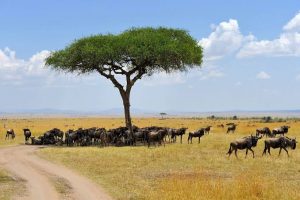
Malaria in Serengeti National Park
Malaria in Serengeti National Park
Malaria in Serengeti National Park is inevitable since the park is bushy and the residents get hit by this dangerous fever most often. Serengeti national park, like any African protected area or national park, is covered by the bushy landscape as well as water catchment areas where the wildlife enjoys fresh water. Most of the water catchment areas of Serengeti national park are stagnant water hence giving fertile grounds for the reproduction of the mosquitoes. Serengeti national park is one of the most popular parks not only in Tanzania but entire Africa and the whole world. Well known for the largest animal migration on the planet Earth, the wildebeest migration is considered as the 7 natural wonders of the world. The park was named after the Maasai word “siringet” which meant the endless plains of the savannah. The park is characterized by the endless short savannah grass dotted with some acacia trees.
The short grassland that dominates the park makes it one of the protected areas with low risks of Malaria. It’s the combination of the short grasses, few water catchment areas and the long dry spell that has contributed to fewer mosquito rates hence making the Serengeti national park malaria cases very minimal. But this does not mean that Serengeti national park is a free Malaria destination. Al guests are advised to come when they have visited their medical personal and taken necessary vaccinations according to the advice from the doctor. You also have to move with tablets of malaria just for an emergency in case of.
All camps and lodges in Serengeti national park have taken initiative to have Mosquito nets so as to safeguard their guests from the mosquitoes that cause malaria. But sleeping in a mosquito net alone does not guarantee you not to get malaria with the fact that guests do very early morning game drives in the bush where mosquitoes are found. You will not go with the net during the game drive hence making it good for guests to move with their insect repellents like DEET which is among the most recommended for most of the countries across the world. This does not only help them on the mosquitoes but also other insects at the bush during the games or when sited for a glass of wine around the fire camping area.
It is not a must to have Malaria vaccination before entering Tanzania or Serengeti but its good if the doctor advises you especially for the pregnant mothers. Malaria in Serengeti national park has very low reported cases that often happens once in a while and mostly during the rainy season from March to May. As said prevention is better than cure, you rather have malaria vaccination before coming to Serengeti or carry your antimalarials to safeguard your self for a better wildlife experience. Guests have to take note of the fact that almost all African protected areas are not malaria-free. For more guidelines on the type of malaria tablets that are recommended for travelers better consult the physician or travel clinic or google directly the CDC website.
It is much better to consult your personal or travel clinic 6 weeks before your travel date to Africa or Serengeti national park. Tanzania is not Malaria free country its highly advised to seek the necessary medical information before traveling to the country. One has to take the Malaria prophylactics before the safari, during your safari in Serengeti and after your safari experience. For details on which prophylactic is suitable for your life please consult your doctor. You can also read online through the website www.malaria.org.za that gives detailed information about malaria is the world.
Serengeti national park malaria information is key to the success of your safari experience in Serengeti national park. Also, be informed that there are other necessary vaccinations that are highlighted as a must to have if you need to enter Tanzania. The most prominent needed vaccination certificate is the Yellow fever certificate. You must carry all these certificates in order for you to get the tourist visa to enter Tanzania. You can carry an International Certificate of Vaccination or Prophylaxis also called Yellow fever card in some countries. For the best of your health, you can also have other vaccinations like Typhoid, Cholera, Hepatitis A&B among others.
Issues of Serengeti national park malaria are minimal and it does not affect your enjoyment on the land of the wildebeest migration. Have the best of the true African wildlife experience by visiting the 7 natural wonders of Africa. You only need to have a concept of prevention is better than cure, follow the highlighted measures below to make your life safe from malaria while in Serengeti national park.

Always carry the most recommended insect repellent that contains 20-35% of DEET whenever you plan to come to Serengeti. Make the best use of it like applying when plaining for the game drives, fire camping, and others. You have to use the insect repellent continuously till the time you leave Africa.
Make sure you have the right parking lists as advised by the travel consultant. You have to wear long sleeved shirts and trousers during the game drives of nature walks to avoid direct exposure of your body to the mosquitoes.
You have to check that the camp or Lodge room has the mosquito net which is not torn at all. You have to put the on the net well. Spray the room or tent before sleeping or burn the mosquito coil before going to the bed.
When you get a small fever or flu-like signs or symptoms during the trip or after please seek the help of the medical personal.



